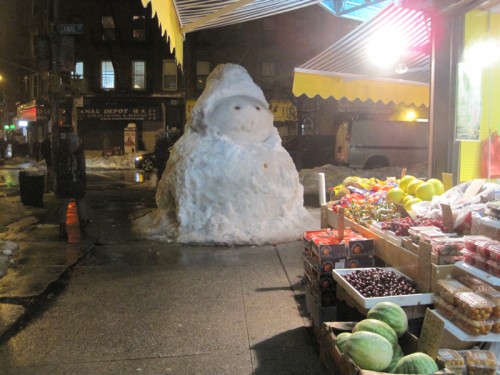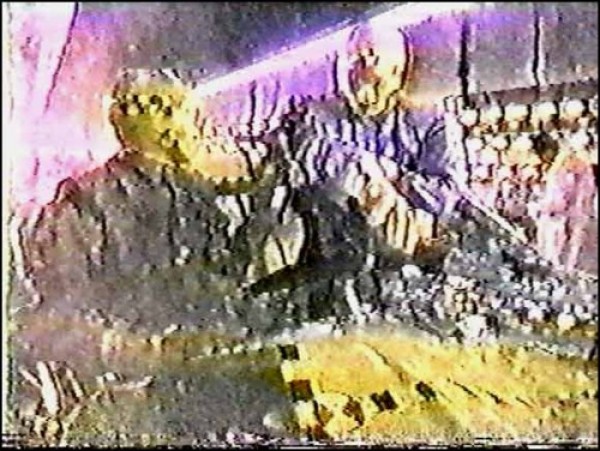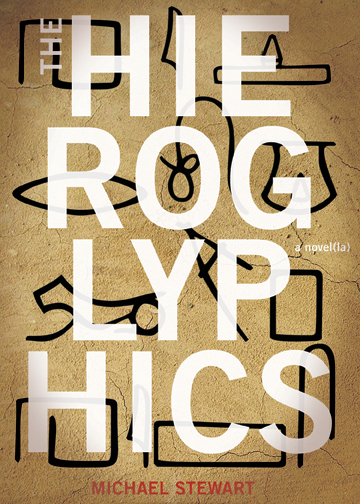I’m on spring break right now
–>VIDEO: Adam Robinson and Stephanie Barber @ The Poetry Project
–>WWAATD: Everyone’s favorite poet Heather Christle writes about the poetry of foreign language textbooks. Here is an excerpt:
1 The patio looks very neat.
2 The apartment is unoccupied.
3 The desk is unoccupied.
4 The kitchen looks very neat.
5 The house looks very neat.
6 The rooms are unoccupied.
7 The houses are unoccupied.
–>NEW YORK: Monkey Bicycle 8 release reading this Wednesday, 7 PM, The Cakeshop, INFO
–>SUBMIT/READ: Patasola Press is Patasola Press (print) and Caper Literary Journal (online) and they will publish you if they like your work.
–>THING: Everyone’s favorite poet Matthew Rohrer writes here about how his work changed from 1995 to 2007. If you click around you can find out that this is part of a series in which poets talk about how their work has changed over time, which is cool.
–>PODCAST: No Slander Podcast, featuring Michael Earl Craig in episode two. Recordings of Michael Earl Craig are hard to find.
“somber silence, broken by periodic weeping.”
“This B-movie fare is widely mocked, often for good reason. But the early “Godzilla” films were earnest and hard-hitting. They were stridently anti-nuclear: the monster emerged after an atomic explosion. They were also anti-war in a country coming to grips with the consequences of World War II. As the great saurian beast emerges from Tokyo Bay to lay waste to the capital in 1954’s “Gojira” (“Godzilla”), the resulting explosions, dead bodies and flood of refugees evoked dire scenes from the final days of the war, images still seared in the memories of Japanese viewers. Far from the heavily edited and jingoistic, shoot’em-up, stomp’em-down flick that moviegoers saw in the United States, Japanese audiences reportedly watched “Gojira” in somber silence, broken by periodic weeping.” – Peter Wynn Kirby (read the rest here)
I’m in love: Holy Warbles, 78 revelations, ethniquities, gospelarians, librarians, gloops, gleeps, magnetique tape, ost, dmt, kvlt, spectral string bands, psychedelique funkenfuzz, songbirds, disembodied voices, tape echo, plate reverb, lepyrlymns, field recordings, holy ghosts of electricity & cloven tongues of fire. (via Dave Segal)
(what is experimental ______ )
“The only way to atone for the sin of writing is to annihilate what is written. But the author can only do that; destruction leaves that which is essential intact. I can, however, tie negation so closely to affirmation that my pen gradually effaces what it has written. In doing so it accomplishes, in a word, what is generally accomplished by ‘time’ — which, from among its multifarious edifices, allows only the traces of death to subsist. I believe that the secret of literature is there, and a book is not a thing of beauty unless it is skillfully adorned with the indifference of ruins.” (Georges Bataille, Abbe C)
2].
The nothing [the void] names that undecidable of presentation which is its
unpresentable, distributed between the pure inertia of the domain of the multiple, and
the pure transparency of the operation thanks to which there is oneness [d’où procède
qu’il y ait de l’un]. The nothing is as much that of structure, thus of consistency, as
that of the pure multiple, thus of inconsistency. (BE 55; emphasis added)
disappear
most clouds are simply mayonnaise
9. New Tony Kushner podcast.
8. Riveting: the day Reagan was shot.
9. When I was in grad school the elderly would oft phone the English department and ask if a grad student “would write my life story.” Anyway, none of us did that I know of, though one student did write porn under a pen-name to make some beer money. Anyway, fascinating article on ghost writing here.
People just seem to be really surprised that the name on the book is not always the name of the person who wrote it.
9. Children e-books? Orwellian. Blue phosphorescence on the face. Worst at bedtime. The smell of blankets and ozone and despair.
This Wednesday, at 9 PM EASTERN (that’s 6 on the west coast), we’ll have the return of the Live Giants online reading series for 2011, beginning with the fantastic double header of Noah Eli Gordon & Sommer Browning, in support of their new books The Source & Either Way I’m Celebrating. As always, all you gotta do is show up here at the site. You can RSVP at Facebook here and we’ll remind you. Two fantastic poets in your living room live. Don’t miss it.
What is Experimental Literature? {Five Questions: Kate Zambreno}
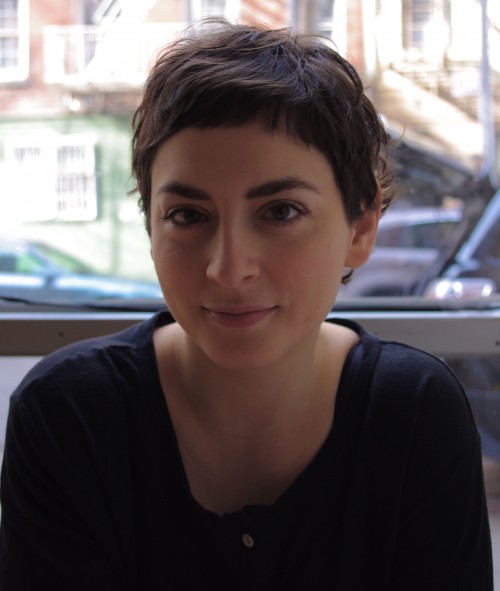
Kate Zambreno is the author of O Fallen Angel, which won Chiasmus Press’ “Undoing the Novel—First Book Contest.” Another novel, Green Girl, will be published by Emergency Press in Fall 2011. A nonfiction book revolving around the women of modernism, Heroines, will be published by Semiotext(e)’s Active Agents series in Fall 2012. She writes the blog Frances Farmer is My Sister. She is also an editor at Nightboat Books. Currently she is curating a series called Prose Event for the Belladonna* Collaborative, which examines the intersection of fiction and the essay. The next Prose Event will be on May 17 at Dixon Place in NYC and will feature Amina Cain, Danielle Dutton, and Renee Gladman.
13 ways of looking at Michael Stewart: An Interview
Back in 2001, I took my very first fiction workshop. It was with Catherine Kasper. I’d never written a short story before. I was a junior. My first story submission was terrible, truly terrible.
Despite my really shitty story, Michael Stewart was nice to me.
I thought he was the best writer in class. (And he was.) And there were some spectacular writers in class.
Over the past decade, Michael and I have consumed a lot of coffee and breakfast tacos together. We have played many chess games and go games. We have seen each other’s heartbreaks and victories.
Michael Stewart is a charming man and a charming writer. His first book, The Hieroglpyhics, is out now (and can be purchased here) with Mud Luscious Press.
Interview Roundup Part Seven: Whitehead, Klima, Krilanovich, Touré, Roy
 “My whole life I’ve seen those elevator inspection certificates. I’d go to school, when I was a kid, and come back and the person had been there, the exact same guy for 10 years. The elevator seemed perfectly fine, so what’d he do? I was thinking about what would make a funny detective story. Well, why not put this person in a situation where he actually has to apply his esoteric skills to a straightforward mystery? But then I had to actually make up what kinds of skills he had, and it became all about elevators and not so much this chase-the-McGuffin sort of story.” – Colson Whitehead, in Salon
“My whole life I’ve seen those elevator inspection certificates. I’d go to school, when I was a kid, and come back and the person had been there, the exact same guy for 10 years. The elevator seemed perfectly fine, so what’d he do? I was thinking about what would make a funny detective story. Well, why not put this person in a situation where he actually has to apply his esoteric skills to a straightforward mystery? But then I had to actually make up what kinds of skills he had, and it became all about elevators and not so much this chase-the-McGuffin sort of story.” – Colson Whitehead, in Salon
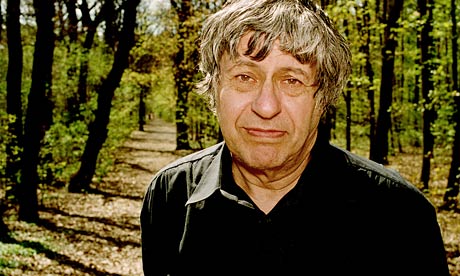 “I said something simple about the situation and there was tremendous applause. The strange thing was that afterwards many people came up and said that they had not known I was living in Prague all these years. Blacklisted writers had been made non-existing persons by the regime. People thought we lived in exile; in a way we did.” – Ivan Klima, in The Guardian
“I said something simple about the situation and there was tremendous applause. The strange thing was that afterwards many people came up and said that they had not known I was living in Prague all these years. Blacklisted writers had been made non-existing persons by the regime. People thought we lived in exile; in a way we did.” – Ivan Klima, in The Guardian
 “Oh yes, I explicitly used cutups for this novel. Lots and lots, especially during the big push, the heavy lifting that took place in ’06. And I’m talking cutups in the classic Burroughs/Gysin sense, two texts sliced down lengthwise and reattached with their opposites: AA and BB become AB and BA. Then you strike out the word fragments caught in between so it looks like a crooked seam. They’re great aesthetic objects, just on their own. You may notice a few words and scenarios in the OEC crop up again and again—I think some of the sections involving day laborers—and that’s the residue of the cutups. Eventually I rewrote things so much that the effect was mostly obliterated, but it did help generate content, which was my reason for doing them. I wanted to come up with ideas that I couldn’t simply conjure up through ordinary means—out of thin air, the old fashioned way.” – Grace Krilanovich in Hobart
“Oh yes, I explicitly used cutups for this novel. Lots and lots, especially during the big push, the heavy lifting that took place in ’06. And I’m talking cutups in the classic Burroughs/Gysin sense, two texts sliced down lengthwise and reattached with their opposites: AA and BB become AB and BA. Then you strike out the word fragments caught in between so it looks like a crooked seam. They’re great aesthetic objects, just on their own. You may notice a few words and scenarios in the OEC crop up again and again—I think some of the sections involving day laborers—and that’s the residue of the cutups. Eventually I rewrote things so much that the effect was mostly obliterated, but it did help generate content, which was my reason for doing them. I wanted to come up with ideas that I couldn’t simply conjure up through ordinary means—out of thin air, the old fashioned way.” – Grace Krilanovich in Hobart
 “Early on there was an assumption from editors that I could write about hip-hop and black music but not about white music. Once an editor suggested I’d be lost writing about Eric Clapton, which is strange because he’s steeped in black music. I just kept fighting and I found white subjects who others didn’t want to cover and did them well. In time my editors realized I could write about anything.” – Touré in No Strings Attached News
“Early on there was an assumption from editors that I could write about hip-hop and black music but not about white music. Once an editor suggested I’d be lost writing about Eric Clapton, which is strange because he’s steeped in black music. I just kept fighting and I found white subjects who others didn’t want to cover and did them well. In time my editors realized I could write about anything.” – Touré in No Strings Attached News
 “I don’t see a great difference between The God of Small Things and my works of nonfiction. As I keep saying, fiction is truth. I think fiction is the truest thing there ever was. My whole effort now is to remove that distinction. The writer is the midwife of understanding. It’s very important for me to tell politics like a story, to make it real, to draw a link between a man with his child and what fruit he had in the village he lived in before he was kicked out, and how that relates to Mr. Wolfensohn at the World Bank. That’s what I want to do. The God of Small Things is a book where you connect the very smallest things to the very biggest: whether it’s the dent that a baby spider makes on the surface of water or the quality of the moonlight on a river or how history and politics intrude into your life, your house, your bedroom.” – Arundhati Roy in The Progressive
“I don’t see a great difference between The God of Small Things and my works of nonfiction. As I keep saying, fiction is truth. I think fiction is the truest thing there ever was. My whole effort now is to remove that distinction. The writer is the midwife of understanding. It’s very important for me to tell politics like a story, to make it real, to draw a link between a man with his child and what fruit he had in the village he lived in before he was kicked out, and how that relates to Mr. Wolfensohn at the World Bank. That’s what I want to do. The God of Small Things is a book where you connect the very smallest things to the very biggest: whether it’s the dent that a baby spider makes on the surface of water or the quality of the moonlight on a river or how history and politics intrude into your life, your house, your bedroom.” – Arundhati Roy in The Progressive
Everyday Draft Crow Bomb Lolita King Rattling
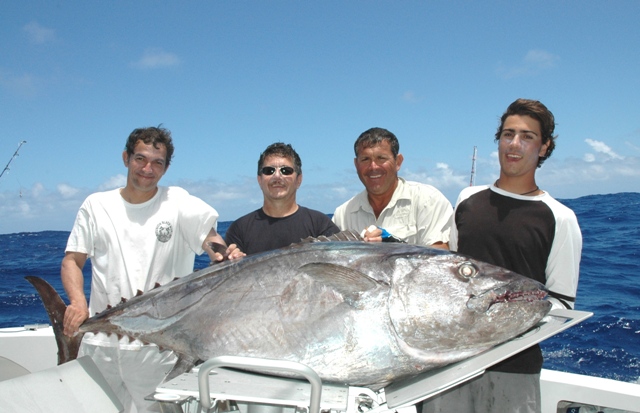
1. I haven’t closed in my browser this piece by Kristen Iskandrian at Everyday Genius since it was published about three weeks ago.
2. Draft: a journal of process is a new magazine that shows author’s revision processes in crafting a piece. The first issue contains versions of work by Mary Miller and Greg Hrbek; a really interesting twist on a vision at the way a thing becomes.
3. In Portland, a new artists community has opened, Crow Arts Manor, offering gallery space, workshops, readings, and a lot more.
4. Bomb’s 2011 Fiction Contest is now accepting submissions, judged by Rivka Galchen.
5. At the Observer, a review of Tiger, Tiger by Margot Fragoso, a book about “a real life Lolita” & radio-centric speed dating.
6. Coming up in Beverly Hills, CA: PEN Center USA will present THE PALE KING: MONOLOGUES FROM THE UNFINISHED NOVEL BY DAVID FOSTER WALLACE at the Saban Theatre in Beverly Hills on April 28, 2011. Doors will open at 7PM with a cocktail reception. To purchase tickets contact The Saban Theatre Box Office, Tuesday through Friday 12:00pm – 5:00pm; Phone: 323-655-0111.
7. And in Los Angeles, a release party for the debut issue of a new magazine, The Rattling Wall: PEN Center USA and Narrow Books at the Hammer Museum on May 11, 2011 at 7PM for the release of The Rattling Wall, a literary journal specializing in short fiction, travel essays, and poetry.

